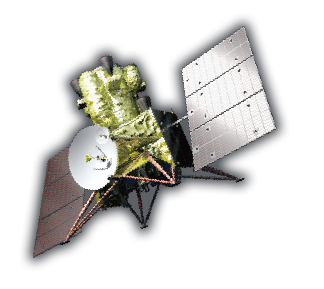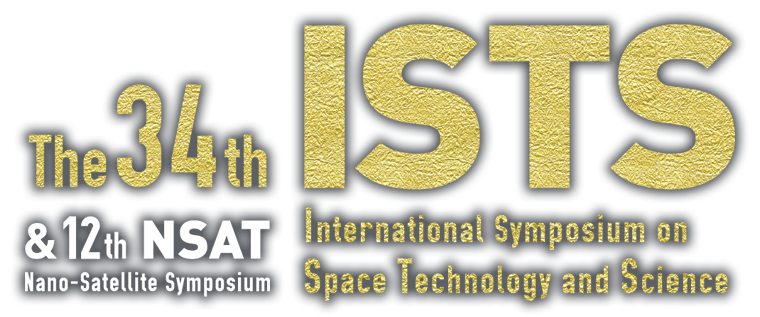Main Theme: ” Space for All of Us”
Synopsis
The 34th ISTS Organizing Committee and the Japan Society for Aeronautical and Space Sciences (JSASS) would like to invite individuals of all nations interested in space-related activities to participate in this event. The 34th ISTS will be held under the main theme of “Space for All of Us”. We are also very glad to hold together 12th Nano-Satellite Symposium(NSAT) jointly with ISTS. Please join us at this event in Kurume, Fukuoka.
Kurume is a medium-sized city in Fukuoka Prefecture, Japan. Located 30 minutes by local train (17minutes by Shinkansen) and less than an hour by car from Fukuoka City, Kurume is a transportation hub for southern Fukuoka Prefecture. It is the commercial center of the Chikugo area, and there are various stores and malls, making it convenient for shopping. Despite its attractiveness as a town, what is indispensable when talking about Kurume is its rich nature. The Chikugo Plain, where Kurume City is located, is known for its thriving production of rice, wheat, vegetables, and fruits.
We will welcome you with a variety of programs, including keynote speeches, World-Space Highlights, special lectures, and poster sessions in plenary format and, in parallel format, general and organized technical sessions, student sessions, as well as a control contest, Gemstone project of young people and social programs to help you experience and enjoy Kurume.
We are looking forward to seeing you at the 34rd ISTS, 12th NSAT in the beautiful city of Kurume, with many recreational facilities and local cuisine and crafts.
Sessions
The Symposium will address various fields of space-related technology and science. It will include Special Programs, Organized Sessions, 19 Technical Sessions of contributed papers, the Student Session and so on.
Plenary Special Programs after the Opening Ceremony
• Special Program 1: World Space Highlight
• Special Program 2: Sustainable Space Activities (Title TBD)
Organized Session (Special Sessions)
・Sustainable Space Transportation for the Next-Generation
・Space Exploration Program (Title TBD)
・Young Professional Program, Sustainable Space Development Program 2040 (Title TBD)
Technical Sessions
a) Chemical Propulsion and Air-breathing Engines
Solid, Liquid, Hybrid Rockets, Air-breathing Engines, Reusable Rockets
b) Electric and Advanced Propulsion
Electric Propulsion, Laser/Microwave Propulsion, Solar-thermal/Sailing Propulsion, Electrodynamic Tether, Nuclear Propulsion, Magneto hydrodynamics, Micro thrusters, Thruster Plume and Spacecraft Interactions, Plasma Technologies, Non-propulsive Applications, Powered Flight Mission
c) Materials and Structures
Structures of Space crafts and Space Vehicles, Structural Dynamics and Control, Structural Analysis, Tests and Nondestructive Inspections, Material Characterizations, New Materials, Smart materials and structures, Composite materials, Space Environment Interactions, Composite Materials
d) Astrodynamics, Navigation Guidance and Control
Attitude Dynamics, Attitude Determination & Control, Attitude & Payload Sensor Calibration, Orbital Dynamics, Orbit Determination & Control, Trajectory Design and Optimization, Mission Design, Spacecraft Navigation, Entry/Landing/Ascent Guidance, Navigation & Control, Orbital Rendezvous & Proximity Operations, Formation Flying & Satellite Constellations, Space Robotics & Rover, Spacecraft Autonomy & Intelligence, Guidance, Navigation & Control Components, Recent Experiences & Lessons Learned
e) Fluid Dynamics and Aerothermodynamics
High Enthalpy Flow, Atmospheric-entry, Aero-thermodynamics, Aerodynamic Design, Rarefied Gas, Radiation, Thermal Protection System, Plasma, Magneto-gas dynamics, Low Speed Aerodynamics, Aerodynamics at Takeoff and Landing, Supersonic and Hypersonic Flow, Gas Dynamics, Wind Tunnel
f) Small Satellite : Joint session with 12th NSAT
Innovative Small Satellite Mission, Small Satellite Utilization, Small Satellite Design and Development, Advanced Small Satellite Technology, Small Satellite Lessons Learned, Small Satellite Launch
Note: Same as the previous 34th ISTS in 2023, papers presented at the session of F) small Satellite are automatically registered as the technical papers of the Nano-Satellite Symposium at the same time.
g) Space Transportation
Reusable Launch Vehicles (RLVs), Expendable Launch Vehicles (ELVs), Reentry Vehicles, Orbital Transfer Vehicles (OTVs), Human Space Transportation, Sub-orbital Space Transportation
h)Microgravity Sciences and Technology
Microgravity Science, Physical Science, Fluid Physics, Combustion Science, Fundamental Physics, Material Science, Microgravity Experiments, Facilities for Microgravity Experiments, Opportunities for Microgravity Experiments, Operation and Utilization of the IS
i) Thermal Control
Thermal and Environmental Control, System and Instrument Thermal Design, Thermal Management, Heat Transfer, Thermophysical Property, Thermal Testing and Analysis, Passive and Active Thermal Control, Technologies, Two-phase Technology, Advanced Thermal Control Materials
j) Satellite Communications, Broadcasting and Navigation
Satellite System Architectures, Networks and Protocols, Experimental Projects and Results, Subsystems, Components and Devices, Propagation, Regulation, Financing and Marketing, Space Navigation Systems, Fixed and Broadcast Satellite Systems, Mobile Satellite Systems
k) Science and Technology for Human and Robotic Space Exploration
Scientific Objectives, Results, and Instruments for Exploration of the Moon, Planets and Solar System Small Bodies; Mission Analysis, Mission Design and Key Technologies of Human and Robotic Explorations; Commercial and Private Initiatives of Space Explorations; Roadmap and Strategies for National and International Space Exploration Programs
m) Sounding Rocket, Balloon and Flight Experiment using Small Flight Vehicle
Promotion of Sounding Rocket or Balloon Programs, Suborbitals, Scientific Results, Engineering Demonstration, Range Facility & Operation, Instrumentation, Upper Atmosphere, Ionosphere, Flight Experiment using Small Flight Vehicle, Parabolic Flights Test
n) Earth Observation
Earth Observation, Earth Environment, Remote Sensing, Remote Sensing Sensors, Application of Remote Sensing, Data and Signal Processing, Data Analysis, Ground System, Data Assimilation, Global Change Prediction, Earth System Science, Disaster Monitoring, Geographic Information Systems
q) Space Power Systems
Solar Power Satellite, Solar Cells, Power Resources, Power Management and Distribution, Power Storage System, Wireless Power Transmission
r) Space Environment and Debris
Space Environment, Space Debris, Meteoroid, Space Situational Awareness, Debris Observation and Measurement, Debris Population and Evolution Model, Debris Risk Assessment and Management, Orbital Dynamics on Debris, Reentry Safety, Hypervelocity Impact, Protection Design, Debris Mitigation, Debris Removal, Debris Environment Remediation, Space Weather, Space Weather Forecast, Spacecraft Charging, Environment Model, Solar and Geomagnetic Activity, Environment Data Management, International Cooperation on Debris and Space Environment, Near Earth Objects, Space Traffic Management
t) Systems Engineering and Information Technology
Systems Engineering – Methodologies, Systems Engineering – System Design, Systems Engineering – Process and Tools, Model Based Systems Engineering, Verification and Validation, IT Application for Systems Engineering, Project Management and Systems Engineering, Risk Management, Software Engineering, Requirement Engineering, Knowledge Management
u) Space Education and Outreach for the Benefit of All People
Space Education, Public Outreach, Public Relations, Capacity Building, Citizen Science, International Collaborative Projects, Students Activity, Space Tourism, Effect of Space Activities on Culture and Humanity, Journalism, Art, Space Events, NanoSat and CanSat for Education, Model Rocket, Amateur Radio Satellite
v) Space Law, Policy and International Cooperation
Space Law (International, Domestic),Space Policy (Foreign, Domestic),Space History (Legal, Policy, Scientific, Technological, Industrial),Space Business and Commercialization
Space Environment (Debris, Resources),Space Governance and Diplomacy
Space Security (Militarization, Weaponization, Disarmament and Arms Control)
International Cooperation (Bilateral, Multilateral, Regional, Global),Humanities and Social Sciences
Others
w) Safety and Mission Assurance
Safety, Reliability, Quality, Software Product Assurance, EEE & Mechanical Parts, Standardization
Student Session
The purpose of this session is to encourage students to present their original research results.
Submitted papers shall be authored by graduate students, undergraduate students, or students in technical colleges or in senior high schools.
In case that the submitted paper is an outcome of a group-work research, it is highly Recommended that the contributions of the author should be clearly stated. An applicant to Student Session must submit a full-length paper by no later than Feb. 1, 2023. Note that the deadline is strict and there is no extension of the due date. The applicants will be temporally assigned to an appropriate session other than Student Session according to their research disciplines. All submitted papers are peer reviewed and the finalists are selected on the basis of technical/scientific merit and originality of the submitted paper. The finalists will be directly notified by the ISTS Committee by Apr. 1, 2023. Those finalists are formally invited to present their papers in Student Session and are eligible for the Student Session Awards.
Those who are not selected as finalists are to present the papers in their originally assigned session.
The 34th ISTS has six Student Awards; the winners will be determined by vote of the
ISTS Committeeʼs referees based on the quality of their presentation at Student Session.
Poster Session
The Poster Session is planned to be held at specified hours during the Symposium. The authors will be
requested to stay in the allocated session room during this Session for explanations and discussions.
Registration Fee
| Early Registration | 60,000 yen |
| On-site Registration | 75,000 yen |
| Early Student (ID Required) | 15,000 yen |
| On-site Student (ID Required) | 25,000 yen |
| Accompanying Person | 10,000 yen |
Pre-registration will be available on the web. Instruction and further information for electronic and on-site registration will be given in the following announcement. Fees for regular and student participants include On-site Digital Medium, which will include all the papers presented at the Symposium. Please be aware that only the regular and the student participants will be allowed to present a paper at the Symposium. Accompanying persons cannot attend any technical sessions.
Paper Distribution
All the papers presented at the 34th ISTS will be distributed either by an On-site Digital Medium or on a Paper Download Web Site for convenience of all the regular and student participants. They are also will be open to public through the ISTS Web Paper Archives Site after the symposium.
http://archive.ists.or.jp/
Journal Publication
After the symposium, authors can submit their papers to “Journal of Evolving Space Activities (JESA)” as well as any other journals. If the authors wish to submit their papers to JESA, the authors must declare their submittals to the Journal at submission of the papers to this symposium. The editorial committee will review the papers submitted to JESA.
Scholarship Program
The 34th ISTS will offer scholarship for limited number of students who are not Japanese citizens and live outside of Japan at the time of application.
For more information, click here.
The 34th ISTS will be held in a hybrid format. The 34th ISTS will be held in person in Kurume City, Fukuoka pref. JAPAN, also, online participation is possible.
| Online Abstract Submission Open | Sep.9, 2022 |
| Deadline for Abstract | Nov.14, 2022 |
| Special Deadline for Paper Upload only for Student Session | Feb. 1, 2023 |
| Notification of Acceptance for All authors | End of Dec, 2022 |
| Second Announcement and Tentative Program Issue | Mar.1, 2023 |
| Notification of Presentation Schedule for All Authors | Apr. 1, 2023 |
| Notification of Selection Results for Student Session | |
| Deadline for Paper Upload | April 30, 2023* |
| Deadline for Pre-Registration | May 8, 2023 |
*Extended to May 29,2023 for Pre-registered Authors.
Note: The author, who has not uploaded the paper by the deadline, is NOT allowed to make a presentation under the “No Paper, No Presentation” policy.


